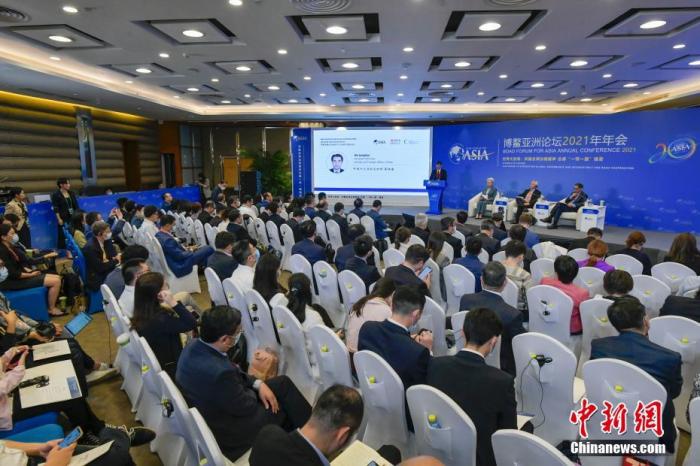(Focus on Boao) Boao Forum for Asia Annual Conference held a sub-forum focusing on "South China Sea Cooperation and New Order Construction"
China News Service, Boao, April 20 (Reporter Yin Haiming) On April 20, the South China Sea theme sub-forum of the Boao Forum for Asia 2021 Annual Conference was jointly organized by the China South China Sea Research Institute, the China-Southeast Asia South China Sea Research Center and the Boao Forum Secretariat. (Hereinafter referred to as "sub-forums") opening.
More than 200 experts and scholars, diplomats in China, former politicians and representatives of government officials from more than 20 countries and regions participated in the conference in a combination of "online" and "offline".
On April 20, the Boao Forum for Asia 2021 Annual Conference held a sub-forum on the South China Sea theme.
The picture shows Fu Ying (second from left), director of Tsinghua University's Center for Strategic and Security Studies, Wu Shicun (second from right), president of China South China Sea Research Institute, chairman of the China-Southeast Asian South China Sea Research Center Council (second from right), Chinese University of Hong Kong (Shenzhen) Global and Contemporary China Dean Zheng Yongnian (first from right) attended the forum.
Photo by China News Agency reporter Luo Yunfei
Fu Ying, director of the International Strategy and Security Research Center of Tsinghua University, said in the sub-forum that relevant countries are currently negotiating on the "Code of Conduct in the South China Sea" (COC) and the parties are implementing the "Declaration on the Conduct of Parties in the South China Sea" (DOC). The pragmatic cooperation between the two countries is making progress.
Of course, disputes still exist, and problems will arise from time to time, which need to be handled properly.
Fu Ying said that it is worth noting that the United States has increased its attention and intervention in the South China Sea, and has created tensions through frequent military activities and other actions, which has increased the uncertainty of the situation in the South China Sea.
This approach is not in line with the direction of regional peaceful development.
Countries in the region advocate cooperation rather than confrontation, and call for dialogue against conflicts. This is also the main theme of the development of ocean affairs in the world today.
Wu Jianghao, Assistant Minister of Foreign Affairs of China, said that the current COVID-19 pandemic continues to spread. As close neighbors, the friendly cooperation between China and ASEAN countries is advancing against the trend and a large-scale deep integration pattern is being formed.
Maintaining peace and stability in the South China Sea is the common strategic goal of China and ASEAN countries.
In recent years, China has adhered to the “dual-track approach” to deal with the South China Sea issue, effectively managed contradictions and differences, and promoted new steps in maritime cooperation.
At the same time, we must also realize that the current level and level of cooperation in the South China Sea are generally limited, and there is still huge potential for expansion.
China will continue to uphold the concept of a community with a shared future and, on the basis of equal treatment and mutual respect, work with all parties to promote maritime cooperation and jointly build the South China Sea into a sea of peace, friendship and cooperation.
On April 20, the Boao Forum for Asia 2021 Annual Conference held a sub-forum on the South China Sea theme.
Photo by China News Agency reporter Luo Yunfei
Wu Shicun, president of the China South China Sea Research Institute, pointed out in his speech that the current situation in the South China Sea is generally stable and controllable.
The general direction of stabilization and improvement has not been greatly disturbed by the influence of some negative factors.
But at the same time, there have been some disturbing changes in the recent maritime situation.
Wu Shicun said that cooperation in the South China Sea is the only option to achieve long-term stability in the South China Sea.
He suggested that the disputing countries should follow the principle of seeking common ground while reserving differences, focus on cooperation in functional areas, and promote governance and cooperation on issues such as the ecological environment of the South China Sea, channel security, and fishery resources protection; Civil facilities, to create a global public service guarantee system in the South China Sea; a new timetable and route map for the "South China Sea Code of Conduct" should be negotiated to meet the expectations of the international community.
Former Philippine President Arroyo participated in the sub-forum online.
In her speech, she reviewed the successful experience of the Philippines, China and Vietnam in the trilateral joint marine seismic cooperation in the South China Sea and the progress of China-Philippines South China Sea oil and gas exploration and development cooperation. She believed that the pragmatic cooperation between China and ASEAN is conducive to the establishment of mutual trust between all parties and the maintenance of peace in the South China Sea. stable.
She expects that China and ASEAN countries can complete the consultation on the "Code of Conduct in the South China Sea" on the basis of the "Declaration on the Conduct of Parties in the South China Sea" before 2022, and play an active role in building a new order in the South China Sea.
The South China Sea theme sub-forum of the Boao Forum for Asia Annual Conference was established in 2014. It has become a high-standard and institutionalized multilateral dialogue and exchange platform for experts, scholars, media, enterprises and government officials who are concerned about the South China Sea issues and regional maritime cooperation and governance within and outside the region.
The theme of this sub-forum is "South China Sea Cooperation and the Construction of a New Order" and lasts for two days.
(Finish)

